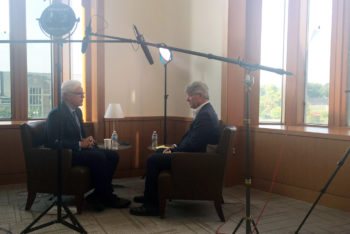Poets & Quants Editor John Byrne recently visited Washington University to learn more about Olin’s program offerings, meet with students, and talk one-on-one with Dean Mark Taylor about the school’s upcoming “strategic refresh.”
 According to Byrne’s just-published interview with Dean Taylor, the pair’s discussion covered a lot of ground: the potential for a one-year MBA, the future of online learning at Olin, taking leadership inspiration from Shakespeare’s Henry V, and Dean Taylor’s love of all things St. Louis (he tells Byrne that St. Louis “feels to me like one of the world’s great cities”).
According to Byrne’s just-published interview with Dean Taylor, the pair’s discussion covered a lot of ground: the potential for a one-year MBA, the future of online learning at Olin, taking leadership inspiration from Shakespeare’s Henry V, and Dean Taylor’s love of all things St. Louis (he tells Byrne that St. Louis “feels to me like one of the world’s great cities”).
Check out some of the highlights from the interview below, and stay up-to-date on Olin’s latest happenings by following Olin and Dean Taylor on Twitter.
Considering a one-year, accelerated full-time MBA program
“I think there is an opportunity for thinking about flexibility in the MBA program. The MBA has to shift in terms of what it offers. If you look at the trend of returns to MBAs, they have been declining while the costs have been increasing. People are thinking hard about the value proposition of a traditional MBA.
“One way of thinking about MBA candidates and students is as career accelerators and career changers. Some students know exactly what career they want to be in, and they are already in it. They really want to accelerate their career, get the human capital that an MBA imparts, perhaps increase their network of contacts, and do the MBA as fast as possible. Career changers would rather take a couple of years to perhaps do one or more internships and really ponder which way they want to take their career. We have to cater to both of those audiences here.”
Olin’s close-knit community
“Olin Business School offers world-class instruction, faculty that is second to none in the world and who are very approachable. There is an intimacy in the classroom between faculty and students that would be hard to find elsewhere in top schools. Everyone who comes to Olin has a name and a story. You are well known by the faculty and supported by an excellent staff. That is one aspect of Olin that marks us out from our competitor schools.”
Olin’s first century in business
“We were one of the first business schools to be launched in the U.S. 100 years ago. We have grown from a small class of 20 or so to one of the great business schools in the world, with extensions in Mumbai and Shanghai as well as in Washington, D.C., through the Brookings Institution. We are a full-service school with a top-ranked undergraduate program, a leading MBA program, and a range of master’s programs, executive education, and a thriving doctoral program as well.”
Interdisciplinary influences on business education
“Literature really tells us a lot about human nature and the human condition. Thinking about those issues is a very important part of humanity and being an effective business leader. The performing arts are very important, particularly in a business school education. Being able to project, persuade, and get one’s views across is in one sense a part of drama.”
What Olin looks for in students
“We are looking for individuals who are excellent and who want to pursue excellence. We are looking for people who have a strong values system and want to have a global outlook. Our vision is global and our thinking is entrepreneurial. The environment here is a very supportive one. I wouldn’t want to be up against any of our graduates in the marketplace, but I certainly would want to be one of their colleagues.”


